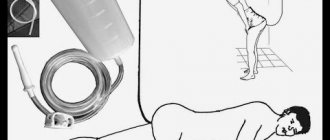Premenstrual syndrome (PMS) has approximately 150 different symptoms. In this case, the most common is dizziness (vertigo), in approximately 70% of cases. This symptom of PMS negatively affects the quality of life: concentration and mood deteriorate, and performance decreases. Severe dizziness also increases the risk of injury. During dizziness, a woman may also feel severe pain in the head, heaviness, nausea, and often swelling of the lower extremities.
Causes of dizziness after menstruation
Why do you feel dizzy during and after menstruation, and why do you feel nauseous and dizzy during menstruation? The reasons for feeling unwell can vary greatly. Low blood pressure can cause vertigo and nausea, but in some cases it is due to migraines with sharp pain in the head. If you take analgesics during your period, this can also cause dizziness.
Frequently repeated sudden changes in pressure (either low or high) significantly affect the entire menstrual cycle. During this period, there is a strong increase in the number of female hormones, which leads to disruption of the woman’s reproductive system.
Swelling is a completely natural condition before menstruation. The fact is that 2–3 days before menstruation begins, a woman’s weight increases to 3 kg. This occurs due to the accumulation of fluid in the abdominal cavity. Swelling disappears without a trace after hormonal balance is restored.
All women's bodies are different and therefore, if someone feels nauseous before the onset of menstruation, then another girl may experience swelling. Most often, nausea disappears after 2–3 days. During this period, a woman is recommended to rest more often, drink green tea, and also be more attentive to her diet. But in cases where the nausea is very severe or there is vomiting, you need to seek help from a doctor as soon as possible.
Pathological causes
Normally, the state of health during menstruation deteriorates slightly , the woman continues to lead her usual lifestyle. Severe weakness and dizziness, accompanied by severe pain, vomiting or nausea during menstruation, should alert you. The causes of such changes are most often pathological. The woman needs treatment.
Premenstrual syndrome
Every month during menstruation, severe weakness is observed, accompanied by dizziness, nausea, pain in the abdominal area and irritability. In medicine, the combination of these clinical manifestations is called premenstrual syndrome. The degree of its severity varies.
During the normal course of menstruation, a woman does not experience severe discomfort, her condition only slightly worsens and all unpleasant sensations do not cause much discomfort. In situations where PMS symptoms are excessively pronounced, medical help is needed. Such changes indicate a pathological process. It can be triggered by stress, smoking and drinking alcohol, lack of vitamins, excessive physical activity and diseases developing in the body.
Anemia
One of the serious factors that can provoke weakness after menstruation is a change in blood composition.
Menstrual bleeding often causes a decrease in hemoglobin levels. Against this background, anemia may develop. Most often, such changes are observed in women with a suppressed immune system and with a history of gynecological diseases.
If there is significant blood loss during the period of critical days, a general malaise is noted, which is accompanied by nausea and vomiting. Symptoms indicating a decrease in hemoglobin levels include:
- pallor;
- arrhythmia;
- shortness of breath;
- metallic taste in the mouth.
If such symptoms appear, you should seek help from a doctor.
Depressive state
Hormone levels are constantly changing throughout the cycle. This causes depression and unpleasant sensations during the period of regulation. The woman feels very bad, she doesn’t want to do anything, she experiences a lack of physical and emotional strength. Closer to the middle of the cycle, the condition returns to normal.
Vegetovascular dystonia
Poor health after menstruation is observed in women suffering from vegetative-vascular dystonia. This pathology is characterized by sharp jumps in blood pressure, most often there is a significant decrease in blood pressure. As a result, malaise is noted during the period of critical days.
You can determine the relationship between deterioration in well-being and VSD at home. To do this, you need to systematically measure pressure at different periods of the cycle.
The connection between vertigo and hormonal imbalance
Many are confident that a large number of female diseases during menstruation have a direct connection with hormones. And in fact, during premenstrual syndrome, the female body undergoes changes, as the amount of hormones increases sharply.
Hormones can affect both the physical state of the female body and psycho-emotional well-being. During PMS days, women experience frequent mood swings, as well as outbursts of anger and rage. Qualified specialists advise taking medications during this period that will reduce the activity of the nervous system. These include preparations from valerian and motherwort root, which are produced in the form of tablets or tinctures. It is also necessary to regularly take long walks in the fresh air, and also rest for about 10 hours a day. Phys. Loads should be reduced during this period. For example, when playing sports, the load should be as low as possible. It is also necessary to avoid water procedures and warm baths at this time.
Preventive measures
A one-time vertigo should not be a cause for concern, but regular dizziness should definitely be considered as a symptom. What prevention should be started 1 week before menstruation in order to avoid nausea and fainting:
- reduce the amount of salt in food;
- do not drink alcohol during PMS and menstruation;
- do not overwork mentally and physically, sleep well and a lot, do not take on complex and difficult work projects, do not get into a showdown in your personal life;
- Take a contrast shower 1 or 2 times a day; if your hair is long and it is not possible to wet your head, then expose your neck to the contrast stream;
- massage your feet and neck;
- if possible, do light exercises every day, exercises that involve the anterior wall of the abdominal cavity;
- do not engage in intense sports training or heavy physical work;
- Do not lift loads exceeding 10 kg.
These recommendations provide maximum peace of mind and other body systems. The main causes of many ailments are a lack of rest and peace, and constantly increased anxiety. From the endocrinology perspective, this looks like a reduced amount of endorphins and an increased amount of hormones from the adrenaline group. Such hormonal levels negatively affect both the quality and duration of life. Adrenaline increases blood pressure, which in turn causes dizziness. If the patient has a hobby or hobby, for example, watching French comedies, you need to set aside time for this and enjoy it more.
Many women during their periods and on the eve of their arrival experience a lack of energy and strength. Weakness during menstruation can be so severe that it becomes difficult to carry out daily activities. The reasons for poor health vary. It is quite difficult to identify them without the help of a doctor.
A number of changes occur in a woman’s body every month, which are the cause of ailments. In the second half of the menstrual cycle, the state of hormonal levels changes. The level of estrogen decreases, and the concentration of progesterone begins to rapidly increase, which is the reason for poor health before menstruation. Hormonal imbalance leads to decreased performance, sleep disturbances and sudden mood swings.
After the end of the ovulation period, the body actively prepares for pregnancy. At the same time, it is quite normal for the mammary glands to increase in size and appetite to increase.
If fertilization does not occur, then the reproductive organ is prepared to reject the functional layer of the endometrium, the uterus begins to contract, and women experience pain in the abdomen and sacrum. Such symptoms are often accompanied by weakness and.
Before the arrival of critical days, a woman’s body may experience a lack of vitamins C and A, as well as microelements such as iron, magnesium, sodium and calcium. For this reason, general malaise, low blood pressure and pale skin may occur. Such symptoms may appear due to severe tension in the central nervous system, in which hormones are synthesized and the processes of the menstrual cycle are regulated.
Nausea during menstruation as a sign of pregnancy
Nausea can also occur when a woman is pregnant. Main features:
- bleeding (often women perceive this symptom as menstruation);
- dizziness;
- weakness;
- nausea;
- sexual intercourse without using contraceptives that occurred several weeks ago;
- poor appetite;
- the discharge is spotting, there is very little of it;
- food poisoning should be completely excluded.
If several signs are present at once, doctors advise taking a pregnancy test or you can donate blood to check the hCG level. You should immediately go to the hospital at the slightest suspicion of pregnancy, because bleeding is a symptom of an ectopic or frozen pregnancy.
In the case when a woman systematically feels dizzy before her period, as well as after it, she is recommended to consult with a qualified specialist.
In this case, you may need to consult a neurologist and a gynecologist. They will have to conduct a study, the purpose of which is to identify a serious disease, if any.
Treatment for vertigo depends on the cause of this symptom. And the doctor, taking them into account, can prescribe the following medications:
- antihistamines;
- hormonal - in most cases, oral contraception is recommended;
- that relieve nausea (for example: Dramamine or Cerucal).
In order to improve your well-being during menstruation, experts advise drinking plenty of clean water. This will normalize the body's water balance.
In order to avoid the appearance of vertigo, you need to try to include all the necessary vitamins and microelements in your diet. At this time, it is advisable to consume large amounts of buckwheat, apples and liver. Chocolate also has a beneficial effect on the body.
During PMS, doctors advise following a few fairly simple rules:
- avoid excessive mental stress, stop working out in the gym for a while;
- Avoid stressful situations if possible;
- take frequent walks in the fresh air;
- do not drink alcoholic beverages and coffee;
- reduce the amount of smoked products, as well as those containing a lot of salt, in your diet.
Moderate physical exercise can bring your health back to normal and eliminate dizziness during menstruation. exercises. The fact is that they help increase the amount of endorphin in the body.
This helps reduce sensitivity to pain and also significantly improves your mood. Women who lead an active lifestyle, thanks to this, only rarely suffer from unpleasant manifestations of PMS.
Temperature during menstruation
Some girls experience fever during menstruation. Medical experts say that a slight increase in blood pressure should not be a cause for concern. After all, the female body experiences some stress during menstruation, loses blood and becomes dehydrated. Therefore, many feel weak and lack of appetite. If in the evening the temperature rises a little more than 37 degrees, then most likely this is caused by fatigue. If there is a significant increase in temperature, and in addition severe pain appears, you need to call a doctor. Since high temperature during menstruation may indicate problems in the female genital area. When the hormonal balance is not disturbed, the process of menstruation does not cause severe discomfort.
High fever during menstruation may result from an infection. During menstruation, the uterus opens slightly, making it easier for bacteria to enter. For this reason, many women prefer to use pads rather than tampons. During this period, it is very important to monitor personal hygiene.
Temperature during menstruation may indicate the presence of inflammatory processes in the intestines. After all, women often suffer from diarrhea during this period. And the increase in temperature in this case is the reason for a thorough examination.
Approximately in the middle of the monthly cycle, ovulation occurs, during which a phenomenon such as an increase in temperature is observed quite often. Girls who monitor changes in basal temperature can determine the most suitable moment for conception.
Another reason why pain and high temperature may appear during menstruation is pregnancy. If these symptoms occur, perform a special test, and if the result is positive, consult a doctor to rule out the presence of an ectopic or frozen pregnancy.
The last reason for increased temperature during menstruation is early menopause.
Folk remedies for dizziness
If you wish, you can resort to traditional methods:
- To prepare the tincture, pour 20 g of meadow clover into a container, pour in 250 g of vodka and place the container in a dark place. After 14 days, the tincture will be ready. It is taken within 15 minutes. before meals, 30–40 drops.
- To prepare the infusion, you need to pour 20 g of mint or lemon balm into a container and pour in 250 g of just boiled water. After 60 min. the infusion will be ready. You should drink the drink 4 times a day on an empty stomach. Single dose - 60 g.
- Add 20 g of St. John's wort to 250 g of just boiled water. The infusion will be ready after 2 hours. Take 3 times a day, 80 g.
- Add 20 g of crushed dry plantain leaves to 250 g of just boiled water. Add 5 g of honey to the cooled drink. Drink it before bed.
- Add 5 g of parsley seeds to 250 g of water that has just boiled. This should be done in the evening. The next morning the infusion will be ready. They drink 60 g 4 times a day half an hour before meals.
- Hawthorn berries are poured into a thermos filled with boiling water. This drink is drunk like tea.
- You need to take white peony roots, mint and linden blossom in a ratio of 2:4:3. Everything needs to be crushed and mixed. Pour 20 g of the mixture into 0.5 liters of just boiled water. The infusion will be ready in 12 hours. Take 4 times a day, ½ tbsp. half an hour before the meal.
- Add 20 g of nettle herb to 150 g of boiling water. Insulate the container with a blanket and wait 4 hours. The drink is filtered and mixed with fresh apple juice in a 1:1 ratio. Take 3 times a day, 50–100 g in 15 minutes. before the meal.
- Add 10 g of peppermint leaves and valerian roots to 400 g of water. Let simmer for 15 minutes. Add 15 g of instant coffee to the cooled drink. Take 3 times a day, 20 g.
You can also include beetroot, carrot and pomegranate juice in your diet, as well as tea with linden blossom and ginger. Before eating, it is recommended to eat 2 small branches of lemon balm or 5 g of seaweed powder.
Sea kale powder is a source of iodine and phosphorus, and pomegranate juice helps increase hemoglobin and eliminate hypoxia. For depression, apathy and anxiety, the use of St. John's wort is recommended.
Teenage girls are recommended to take fish oil, which can ease cramping pain.
Folk remedies for vertigo:
- pour 5 g of apple cider vinegar into 250 g of boiled lukewarm water and add 5 g of honey, drink the solution;
- mix rosemary essential oil and camphor in a 1:1 ratio and inhale;
- Finely chop the onion and inhale the smell until tears appear.
If you feel dizzy during your period and after it ends, you need to be examined by a neurologist or gynecologist. The fact is that vertigo can be a symptom of a serious illness.
The menstrual cycle includes cyclically repeating (every month) changes in a woman’s reproductive system and ensures the conception of pregnancy. The external manifestation of the menstrual cycle is bloody discharge from the genital tract, menstruation. In a gynecologically healthy woman, menstruation occurs painlessly, without delay, and the approach of menstruation does not cause discomfort. However, this is an ideal situation; in practice, premenstrual syndrome often develops, and menstruation itself is accompanied by weakness and discomfort. One of the typical symptoms is dizziness during menstruation.
How to eliminate the malaise
When darkening occurs in the eyes, a woman experiences a very severe headache and nausea, she needs to take a sitting or lying position, unbutton her clothes in the neck and chest area. This will provide the necessary air access. You can open the window first. Then it is recommended to take a few deep breaths.
If a woman feels sleepy, if possible, she should listen to her body and rest. This occurs due to the processing of hormones, which requires a lot of energy. Therefore, during menstruation this condition occurs. A woman's body needs restoration.
You can normalize your health with the help of several medications:
- Ibuprofen (1-2 tablets every 4-6 hours) and Ketones (10 mg every 4-6 hours) should be taken if poor health is accompanied by severe pain during menstruation.
- Dramamine (1 tablet every 4-6 hours) and Cerucal (10 mg 3 times a day) will relieve nausea.
- Andaksin (1-2 tablets three times a day after meals) and Persen (3 tablets 3 times a day) are taken in the presence of stress factors.
- Jess helps get rid of PMS symptoms. They start taking it on the first day of the cycle, 1 tablet per day. This drug belongs to oral contraceptives, the use of which allows you to maintain normal hormones.
- Vitamin complex Vitrum plus – one tablet per day for 1–2 months. They also take Magne B6 6-8 tablets per day with meals, this amount should be divided into 2-3 doses. Other similar drugs can be used. They restore the necessary level of microelements and vitamins in a woman’s body and help get rid of ailments before menstruation and during the period of regulation.
As a result of taking the drugs, many women experience positive changes in their well-being.
Traditional medicine also offers several remedies to help return to normal health. Teas made from lemon balm, ginger, linden and parsley seeds will be beneficial for health. These drinks are easy to prepare:
- Cut the ginger root into thin slices, place them in a container, cover with cool water, put on fire and boil for 20 minutes. After the liquid has cooled, you can add honey. The drink contains a large amount of minerals that a woman needs during her period.
- Melissa-based tea helps normalize the functioning of the nervous system. It will not only eliminate poor health before, during and after menstruation, but will also help with other diseases. This drink is used for gastritis, diabetes, cholecystitis, colds, impaired kidney and gall bladder function. To prepare it, 30 g of dried lemon balm is poured into 1 liter of boiling water. After 30 minutes, the tea will be ready to drink.
- Pour 60 g of dried linden flowers into 1 liter of hot water and leave for a quarter of an hour. This tea will restore the necessary amount of vitamin C in the body.
- Pour 2 tsp. parsley seeds 250 ml of boiling water and leave for 5 minutes. This drink is consumed to normalize the menstrual cycle.
- Weakness after menstruation can also be eliminated with the help of seaweed powder. Women are advised to make juice from beets or carrots and take Ginkgo Biloba infusion. If nausea occurs, drink a glass of kefir or put a slice of lemon under your tongue. During menstruation, you can also drink sauerkraut juice, which should also remove unpleasant symptoms.
Dizziness due to premenstrual syndrome (PMS)
Premenstrual syndrome (PMS) is a complex of complaints and pathological symptoms that consistently appear in the second phase of the menstrual cycle and disappear after menstruation. PMS can cause vomiting and nausea, headaches, dizziness before menstruation, mood disorders, insomnia and swelling.
Depending on which symptoms are most pronounced, there are four forms of PMS:
- Neuropsychic form. Emotional disorders come first. This includes apathy and indifference to everyday events, increased aggressiveness and irritability, tearfulness and excessive emotional reactions. At the same time, in young women aggression is more often observed, in a more mature period - depressive reactions. Headaches and dizziness, bloating, and increased sensitivity of the mammary glands also appear.
- The edematous form is characterized by a pronounced disturbance of water metabolism. Swelling of the face and limbs, lower back appears, sweating increases, women feel thirsty. There is also an increase in body weight due to fluid retention in the body, but not due to the accumulation of adipose tissue. Against the background of water imbalance, the function of the gastrointestinal tract suffers - constipation, bloating and discomfort in the abdomen appear, and increased gas formation with normal nutrition occurs. The edematous form of PMS often develops when menstruation is delayed.
- Cephalgic form. During the period of PMS, it causes intense pain and dizziness, a feeling of rapid heartbeat and discomfort in the heart area. A headache can be similar to a migraine - it is a throbbing one-sided pain in the temple area, at the peak of the sensation, nausea and dizziness, increased sensitivity to strong smells and loud sounds. This form of PMS develops after traumatic brain injury, against a background of severe stress and emotional upheaval, and after infectious diseases of the brain.
- The crisis form is typical for women over 40 years old. It develops in the absence of proper treatment and the progression of milder variants of PMS. In this case, attacks develop that are characterized by increased blood pressure, rapid pulse, mild pain in the heart, panic and unreasonable fear of death.
Dizziness during menstruation
The first day of the appearance of bloody discharge from the genital tract is simultaneously the first day of menstruation and the day the menstruation begins. In the absence of gynecological problems, menstruation does not cause discomfort. In practice, such an ideal situation is unlikely to occur in all cases; menstruation is more often accompanied by a number of symptoms. Dizziness during menstruation develops for the following reasons:
- Continuation of PMS manifestations due to the persisting imbalance of sex hormones. During menstruation, to ensure the shedding of the inner layer of the uterus (endometrium), the level of estradiol (estrogen) and progesterone sharply decreases. Hormone deficiency has a negative effect on the tone of the vascular wall, which can cause dizziness. Also, before menstruation, prolactin levels increase, which contributes to fluid retention and increased blood pressure.
- Taking painkillers, especially too often. To eliminate pain, women take painkillers from the group of Ibuprofen and Paracetamol. These medications can cause dizziness even when taken in recommended dosages, not to mention when taken in excess.
- Intense menstrual bleeding. With prolonged menstruation with intense bleeding, the level of hemoglobin in the blood decreases - anemia develops. This situation is dangerous if there is iron deficiency in the body, since blood loss stimulates the formation of red blood cells (blood elements that contain hemoglobin and carry oxygen). Anemia can cause weakness, fatigue, pale skin, low blood pressure and dizziness.
- Hypoglycemia (decreased blood glucose levels) due to decreased levels of sex hormones. Hypoglycemia itself causes weakness, dizziness and unsteadiness when walking, trembling in the hands and body. In addition, against the background of hypoglycemia, oxygen starvation of the brain develops. In this case, to improve blood supply to the brain, vasodilation occurs, which also leads to a decrease in blood pressure and the appearance of dizziness.
- Migraine attack. Menstruation is a factor that provokes exacerbation of migraines. Against the background of a migraine, along with other symptoms, dizziness also appears.
Examination for dizziness during menstruation
Dizziness can have a clear connection with menstruation or persist regardless of the phase of the menstrual cycle for a long time. There are no drugs that are equally effective for all types of dizziness, and it is not always easy to distinguish one type of dizziness from another. To find out the exact reasons for the development of the disease and answer the question of why you feel dizzy, you need to undergo a full medical examination. Specialists you should definitely visit:
- Neuropathologist. An examination by a neurologist allows you to exclude concomitant pathology of the blood vessels and bone structures of the head. If indicated, X-rays of the cervical spine and skull, electroencephalography (EEG), rheoencephalography (REG), and computed tomography (CT) will be required. A screening will also be performed to screen for migraines.
- Gynecologist-endocrinologist. This specialist will help control the level of sex hormones, which are associated with most complaints that occur during menstruation. In most cases, it is sufficient to determine the level of estradiol, progesterone and prolactin in phase II of the menstrual cycle. Sometimes there is a need for an extensive examination, which includes determining the level of sex hormones on different days of the menstrual cycle to assess changes in their levels.
- Therapist. Dizziness and other menstruation-related symptoms occur in a number of unrelated diseases. For example, swelling is a sign of kidney and cardiovascular diseases, anemia occurs in diseases of the gastrointestinal tract and nutritional disorders, dizziness accompanies hypoglycemia in diabetes mellitus and intoxication of various origins. Before starting treatment, it is important to establish a correct diagnosis.
Prevention and treatment of dizziness during menstruation
What to do if you feel dizzy before or during menstruation:
- It is important to pay attention to measures aimed at preventing deterioration during menstruation in general and dizziness in particular. It will be useful to normalize body weight, adhere to a work-rest regime, ensure a good night's sleep of sufficient duration, as well as increase the production of endorphins through sports and yoga, listening to music, eating strawberries, avocados and bananas.
- Maintaining water balance is essential. You should avoid foods that contribute to fluid retention in the body - salty, spicy, smoked foods. You also need to stop smoking, drinking coffee and alcohol.
- It will be useful to take prophylactic multivitamin complexes - Alphabet, Vitrum, Aevit, Centrum.
- An effective means of normalizing the condition during menstruation is taking combined oral contraceptives. The selection of a drug from this group should be entrusted to a doctor.
- The condition is improved by systematically taking twig preparations (Cyclodinone, Mastodinone) 1 tablet once a day.
- Correction of the psychological state through psychotherapy sessions is also important.
There are about 150 known signs of premenstrual syndrome. One of the most common symptoms is dizziness, or vertigo, which occurs in 70% of cases. It significantly reduces quality of life, interferes with concentration, worsens mood, reduces performance and increases the risk of injury. Vertigo may be accompanied by severe headache, nausea, heaviness and swelling of the legs.
In 70% of women, menstruation is accompanied by dizziness
Reasons for appearance
Slight weakness and malaise may be normal for a healthy woman on the eve of and during menstruation. But the condition is not always associated with increased stress and psycho-emotional stress. This is especially true for the female body. Changes in hormonal levels can be so pronounced that it confuses the fair sex. But you shouldn’t attribute your condition to this alone. Often, weakness during menstruation may indicate serious illness.
Premenstrual syndrome
Its severity ranges from mild malaise to complete asthenia for several days. Weakness in this condition is part of a complex of symptoms. Along with it, lethargy, headache, nausea or even vomiting, pain in the mammary glands and lower abdomen, irritability, tearfulness, nervous excitability and others appear. Rarely does one woman experience everything at once.
Symptoms of premenstrual syndrome, including weakness, are largely dependent on lifestyle. Insufficient physical activity, poor or excessive nutrition, deficiency of vitamins and microelements in food (especially magnesium, C, A, E), nicotine and alcohol abuse lead to a more vivid clinical picture.
Depressive state
Changes in hormone levels throughout the cycle often lead to depression on the eve of and during menstruation. At the same time, sometimes a woman perceives this as weakness: she doesn’t want to do anything, she lacks emotional and physical strength. Gradually the condition passes, and by the middle of the cycle she feels well.
Decreased hemoglobin levels
Changes in blood counts are one of the serious reasons why a woman may feel tired and lack of strength. Many people do not even suspect that gynecological pathology sometimes leads to a decrease in hemoglobin levels in the blood. But it cannot be otherwise, because during menstruation a woman normally loses up to 150 ml of blood, and with pathology the figures vary greatly. Large monthly blood loss exhausts all the resources and reserves of the body, and it does not have time to recover. As a result, anemia occurs, sometimes severely, and this requires a blood transfusion.
The following conditions may be the causes of monthly large blood loss:
| Cause | How it manifests itself |
| Uterine fibroids, especially those with a submucous location of the node or large sizes | As a result, the myometrium cannot fully contract, the area of the internal sloughing layer of the uterus increases, and menstruation becomes very heavy. Sometimes the discharge shows the appearance of lumps - clots similar to parts of the liver. |
| Endometrial pathology (hyperplasia and polyposis) | This condition is characterized by acyclic spotting. |
| Oncological diseases of the cervix and uterine cavity | A woman may not even suspect the presence of a malignant pathology. But progressive weakness and malaise will lead her to a doctor, who, upon examination, will reveal the pathology. |
Dizziness during menstruation: causes
Dizziness before menstruation can have various causes. It can be caused by blood loss, lack of iron and hemoglobin, migraines, blood pressure changes, stress, and medications.
Basically, vertigo develops when there is an imbalance between the level of female hormones: progesterone and estrogen. As a result of increasing estrogen levels, the concentration of sugar in the blood decreases, edema appears, migraines and dizziness occur. Lack of progesterone causes fluid retention in the body, edema, weight gain, headaches and dizziness.
In addition, during menstruation, the body uses hemoglobin to form blood cells, which leads to its deficiency. Because of this, the brain does not receive enough oxygen, which causes dizziness, nausea, weakness and apathy.
Women who are overweight, exposed to frequent stress and mood swings, living in large cities, as well as women who smoke are most susceptible to dizziness and headaches. Usually, after giving birth or reaching the age of 30, the unpleasant symptoms that accompany menstruation disappear.
Causes of poor health
Nature intended that the female body should prepare for conception every month. For this purpose, the hormone progesterone is produced in large quantities. If fertilization does not occur, then the level of the hormone decreases sharply, the process of producing prostaglandins begins, which is what causes the onset of menstruation. At this time, the endometrial vessels of the uterus narrow and their blood supply decreases.
The mucous membrane on the uterus gradually peels off, this is how it is cleansed. It comes out in the form of menstrual flow. They represent the lining of the uterus with blood that accumulates as a result of rupture of blood vessels.
Due to the processes occurring in the body, a woman may feel pain in the lower abdomen. During critical days, a woman loses 50-80 g of blood. For women who are anemic and have weak immune systems, blood loss can cause nausea and dizziness. The general condition of the body worsens, drowsiness appears, and in rare cases, loss of consciousness is observed due to hormonal imbalance. As the hormonal levels stabilize, the symptoms of menstruation disappear.
With menstruation, a woman loses blood and this can make her weaker.
Nausea and dizziness during menstruation: how to deal with them?
Many women at the beginning of their periods are plagued by dizziness, accompanied by drowsiness. This condition is explained by blood loss, lack of iron, and decreased hemoglobin. As a result of an imbalance between male and female hormones in the body, the nervous system also reacts to menstruation. Jumps in blood pressure are often observed: in some people it increases during menstruation, in others it decreases. Often on critical days, nausea is added to dizziness. During menstruation, in addition to prostaglandins, a large amount of serotine is released. Its increase in the body negatively affects the removal of fluid from the body, resulting in nausea. Another cause of nausea may be displacement of the uterus and compression of the nerve endings.
If, with the arrival of your critical days, you feel severe headaches and nausea, it is advisable to take a horizontal position. If possible, take time off from work or school. Overwork and ignoring these symptoms threatens loss of consciousness. This happens in rare cases when the body is very weak and suffers from anemia.
Symptoms such as nausea and dizziness can occur not only during menstruation, but also before it. To alleviate premenstrual syndrome and menstrual periods, you can use special medications intended for use during PMS and menstruation, as well as sedatives. Don't ignore drowsiness, don't try to overcome yourself and stay awake as usual. The body signals you to rest and recuperate, because all of it is used to process hormones.
Critical days are stressful for the body, and the temperature may rise as a protective reaction. This process is associated with an increase in hormones. The norm is a slight increase in temperature, a few tenths of a degree. But if, with the onset of menstruation, the temperature rises to 37.5-38 degrees, it indicates the presence of an inflammatory process in the body.
Dizziness during menstruation is a common occurrence, it is advisable to wait it out while lying in bed
Dizziness: first aid
It is impossible to completely eliminate the symptoms of PMS, but you can reduce them and significantly improve the condition of the body.
If, upon the onset of menstruation, a woman feels a headache, dizziness, nausea, then she should open the window, unbutton her collar, lie down or sit down and begin to breathe deeply to supply the brain with oxygen and remove unpleasant symptoms.
To get rid of dizziness and other signs of PMS, it is recommended to take 8-10 drops of a 0.1% atropine solution. No-spa will help remove spasms, and tranquilizers and sedative medications (andaxin, seduxen, persen) will help relieve nervous tension. To replenish the body's natural balance, you need to drink at least 2 liters of water per day.
How to deal with dizziness?
A proper diet containing all the necessary nutrients will help prevent dizziness that occurs before menstruation. It is advisable to include more apples, liver, buckwheat, chocolate and carbohydrates in your diet during this period. There is no need to worry about being overweight, since during menstruation the body burns more calories than usual.
During the premenstrual period, it is recommended to adhere to some rules:
- do not overload the body (both physically and intellectually);
- avoid stress;
- take walks in the fresh air more often;
- give up coffee and alcoholic drinks:
- limit consumption of salt and smoked foods.
Physical exercise that stimulates the production of endorphins will help improve your health and get rid of vertigo. These substances improve mood and reduce sensitivity to pain. Therefore, women who lead an active lifestyle and play sports rarely experience discomfort during menstruation.
Exercising will help you get rid of dizziness during menstruation
Vitamin complexes (Berocca, Magne-B6, Multibion, Vitrum plus) containing iron, calcium, magnesium, vitamins B6 and E will have an effective effect. Food will also help replenish the reserves of vitamins and minerals.
Vitamin B6, which is found in kidneys, liver and yeast, restores hormonal balance and reduces the symptoms of premenstrual syndrome.
Vitamin E, found in milk, eggs, and vegetable oils, reduces tension in the mammary glands and relieves depression and anxiety.
Calcium removes excess water from the body and improves mood. Most of this element is found in cottage cheese, milk and cheese.
Magnesium reduces menstrual pain and anxiety. It is found in nuts, almonds, green vegetables and fruits.
Iron will replenish hemoglobin reserves and relieve weakness and dizziness.
Prevention measures
To prevent dizziness before your period, it is important to take preventive measures. Particular attention should be paid to nutrition. Do not overload your body with heavy and fatty foods; it is better to introduce more vegetables, fruits and herbs into your diet, as well as liver and buckwheat. Foods rich in carbohydrates promote the production of serotonin, which normalizes sleep and relieves increased irritability. In addition, when your period approaches, it is beneficial to eat some dark chocolate every day.
Before the onset of menstruation, you need to follow certain rules:
- Try to be outdoors more often.
- Avoid physical and mental stress.
- Follow a daily routine and try to provide your body with adequate sleep. It is advisable to sleep at least seven hours a day. If you rest properly, coping with the disease will be much easier.
- You need to eat in small portions, if possible at the same time.
- Try to give up alcohol and cigarettes.
- Don't get carried away with coffee and strong tea. It is better to give preference to healthy fruit drinks and herbal decoctions.
- Minimize your salt intake.
- Choose a good vitamin complex.
https://youtu.be/50-OBsY_CQs
To improve your health and gradually get rid of vertigo, it is useful to do special gymnastics. Exercise releases endorphins, which relieve stress and improve your mood. Therefore, physically active women experience menstruation more easily than those who lead a sedentary lifestyle.
Malaise during menstruation is a common occurrence and does not indicate serious health problems. Preventive measures will help cope with dizziness and strengthen the body. If severe pain or other alarming symptoms occur, you should consult a doctor and undergo an examination.
What is the reason for feeling dizzy during menstruation? According to statistics, approximately 80% of women of childbearing age experience dizziness during menstruation. Most often this happens once a month.
Treatment of dizziness using traditional methods
You can also use traditional medicine:
- Dry meadow clover inflorescences (20 grams) are poured with vodka (250 milliliters) and infused for two weeks in the dark. Drink 30-40 drops a quarter of an hour before eating.
- Dry lemon balm or mint herb (20 grams) is brewed with boiling water (250 milliliters) and left to brew for an hour. Drink 60 milliliters 4 times a day before meals.
- St. John's wort herb (20 grams) is steamed with boiling water (250 milliliters) and left for 2 hours. Drink 80 milliliters three times a day.
- Ground dry plantain leaves (20 grams) are poured with boiling water (250 milliliters). When the infusion has cooled, add honey (5 grams). Use before bedtime.
- Parsley seeds (5 grams) are poured with boiling water (250 milliliters) and left overnight. Take 60 milliliters 30 minutes before meals 4 times a day.
- Hawthorn fruits are placed in a thermos and brewed with boiling water. The resulting infusion is drunk instead of tea.
- Mint herb (100 grams), white peony roots (50 grams) and linden flowers (75 grams) are crushed and mixed. The resulting mixture (20 grams) is poured with boiling water (500 milliliters) and left for 12 hours. Drink 100 grams 30 minutes before meals 4 times a day.
- Dry nettle herb (20 grams) is brewed with boiling water (150 milliliters). Leave to infuse for 4 hours, covered with a blanket. The strained infusion is combined with fresh apple juice in a 1:1 ratio. Drink 50-100 milliliters a quarter of an hour before meals three times a day.
- Valerian roots (10 grams) are combined with peppermint leaves (10 grams), poured with water (400 milliliters) and boiled for a quarter of an hour. Add instant coffee (15 grams) to the cooled broth. Drink 20 milliliters three times a day.
It is also recommended to drink carrot, beet and pomegranate juice, tea with ginger and linden blossom, eat seaweed powder (5 grams) or 2 sprigs of lemon balm before meals.
Pomegranate juice will increase hemoglobin and eliminate oxygen starvation, and seaweed powder will provide the body with phosphorus and iodine, which will improve the condition of the vestibular apparatus. St. John's wort will help get rid of anxiety, depression and apathy.
Pomegranate juice will help increase hemoglobin levels and prevent dizziness.
It is advisable for teenage girls to drink fish oil. It reduces cramping pain.
The following remedies will help get rid of an attack of dizziness:
- apple cider vinegar (5 milliliters) and honey (5 grams) are dissolved in warm boiled water (250 milliliters) and drunk;
- combine camphor and rosemary essential oil in equal proportions and inhale;
- chop the onion and inhale its smell until tears appear.
If vertigo does not go away even after menstruation, then you need to contact a gynecologist or neurologist and undergo an examination. Perhaps dizziness is a harbinger of a serious illness.
About 80% of all women during menstruation report feeling unwell. One of the symptoms is the occurrence of dizziness during menstruation. This sign worries almost half of the girls on Earth. That is why ways to combat the unpleasant manifestations of PMS are incredibly relevant.
Methods for eliminating dizziness
If you have vertigo, it is recommended to regularly measure your blood pressure. If dizziness begins, you should immediately lie down or sit down so that your head and shoulders are at the same level. This improves blood circulation in the brain, and so the tissues receive more oxygen. It can also be helpful to close your eyes for a few minutes and lean on something or focus your gaze on one object. You need to measure your blood pressure, pulse and take medicine or call a doctor.
It is advisable to undergo a full examination to determine exactly why you feel dizzy during menstruation.
If doctors have not discovered pathological causes, herbal remedies can be used to eliminate vertigo: tincture of motherwort or eleutherococcus, valerian, Grandaxin, Persen. Among the folk remedies, decoctions of clover, lemon balm, St. John's wort, plantain, hawthorn, parsley seeds, and nettle leaves are effective. They gently relieve PMS symptoms, equalize blood pressure, and have a calming effect on the nervous system.
Among the vitamin complexes for dizziness, Vitrum +, Multibion, and Berroca are prescribed. They contain tocopherol, pyridoxine, calcium, iron, magnesium, which are beneficial for the cardiovascular system.
You need to consult a nutritionist to choose the right diet. During menstruation, it is recommended to drink more fluids, herbal tea, and switch to fractional meals. In order not to overeat, you should not eat three times a day, but divide the daily norm into 5-6 times. It is useful to drink carrot-beet and pomegranate juices, eat enough fresh berries, fruits, and vegetables. It is recommended to give up coffee, alcoholic beverages, and limit salty and smoked foods.
During critical days, severe physical activity, training, carrying heavy objects, etc. are contraindicated. For dizziness, acupressure and general massage will be useful. The purpose of the physiotherapy is to improve blood circulation in the spinal column and in the brain to quickly supply oxygen to the tissues.
You can do acupressure yourself. You need to apply pressure with the pad of your finger for 4 minutes, while rotating clockwise, on the area between the eyebrows, under the nose, around the ears, on the back of the head, and then rub the earlobes.
For dizziness, breathing exercises developed by A. N. Strelnikova effectively help. They are performed at the same pace and in strict sequence.
If you feel dizzy during menstruation, a set of breathing exercises will help. In a sitting position, take 4 short, noisy breaths through your nose, as if filling your lungs with air in portions, clenching your palms into a fist. Then one silent exhalation through weakly closed lips while simultaneously extending the fingers. Rest for up to 10 seconds and repeat again. A total of 24 approaches (96 breaths) will be required.
The next exercise is done standing, with your fists on your sides. Inhale briefly through the nose 8 times in a row, tense your shoulders and lower your arms from your waist. During silent exhalation, the palms return. Repeat 12 times in total.
For dizziness, these 2 exercises in the morning and evening can be done independently, without the presence of a doctor, and at first at partial strength until the body adapts. In total, the complex includes 12 exercises that have contraindications for execution, so therapeutic exercises are recommended to be carried out under the supervision of a doctor in order to exclude unfavorable results from the exercises.
In order to prevent dizziness, it is useful to walk in the fresh air before going to bed, regularly do morning exercises, and take a contrast shower. It is also recommended to ventilate the rooms several times a day and maintain the room temperature no higher than 24 C.
Dizziness during menstruation
Dizziness during menstruation can occur due to non-pathogenic causes, including: excess body weight and the presence of bad habits such as smoking.
Sometimes the emerging illness is absolutely not associated with any disturbances in the body’s functioning and disappears on its own after the woman reaches the age of 30, or after the conception and birth of a child.
What are the main causes of dizziness during menstruation?
During a diagnostic examination, the gynecologist will first of all pay attention to the presence or absence of the following factors that can provoke poor health:
- Severe blood loss, excessive during menstruation.
- Hormonal disorders.
- Pathologies that are associated with changes in pressure.
- Deficiency of iron, hemoglobin.
- Chronic form of migraine.
Dizziness that occurs is not always evidence of serious problems in the female body. If the symptoms are mild at normal times, but clearly appear immediately before the onset of menstruation, then there is no need to panic. A check with a doctor is required if vomiting and severe discomfort occur. A specialist will help determine the true causes of poor health and prescribe therapy to help eliminate the pathological condition.
In addition, it should be remembered that a delay in menstruation with nausea and dizziness can be a sign of pregnancy.
How to prevent weakness during menstruation
To make the passage of critical days easier, you must adhere to the following recommendations:
- Take a warm bath. As a result of this procedure, blood vessels will dilate, blood circulation will improve, the nervous system will calm down and tension will go away. The water temperature should be within 39°C. A hot bath during menstruation is contraindicated. Also, do not visit saunas and steam baths these days. Find out more about why it is not recommended to take a bath during your period.
- Engage in moderate exercise. Opt for light running, yoga, swimming or walking. This will have a beneficial effect on the abdominal muscles and reduce the intensity of pain.
- Do not drink coffee during your period. Drinking this drink leads to vasoconstriction. In a woman, this can cause increased pain. Caffeine also has an activating effect on the nervous system, which is undesirable during menstruation. A week before the onset of regulation, give up alcoholic beverages and tobacco products.
- Get enough sleep. With proper rest, women feel relief. It helps reduce pain, restore hormonal balance and normalize blood sugar levels. In addition to sleeping at night, you should rest for half an hour in the afternoon.
- Pay attention to nutrition. Earlier in the article it was mentioned that during menstruation, a woman loses elements beneficial to the body. Therefore, to normalize the condition, the lost substances need to be restored. Include boiled poultry, beef, buckwheat porridge, pomegranates, apples, nuts, dark chocolate, cottage cheese, kefir and seafood in your diet.
Causes of illness after menstruation
Most often, dizziness during menstruation does not surprise anyone. But why can such a symptom occur after the end of the critical days?
This can happen due to a deficiency of hemoglobin in the blood, as well as due to deviations in pressure readings from the norm.
In addition, low hemoglobin can cause dizziness and nausea to occur during menstruation. In this case, the brain is insufficiently supplied with oxygen, causing the woman to feel unwell and have problems with spatial orientation and balance.
So, now it’s clear why dizziness occurs before menstruation.
Classification of PMS symptoms
If dizziness and nausea are observed during and after menstruation, then the symptoms, depending on the pathologies of the NS and CVS, can be of two types:
- Central type. In this case, the symptoms are characterized by disruption of brain activity due to edema and hypoxia. The reason for this phenomenon is often a sharp narrowing and expansion of vascular structures in the initial period of menstruation.
- Peripheral type. They arise not due to menstruation, but due to the development of pathologies of the inner ear or vestibular apparatus.
Taking into account the frequency of occurrence of dizziness, there are:
- Systemic symptoms. It occurs with every menstruation due to an imbalance of hormones in the body and pathologies of the vestibular apparatus.
- Non-systemic symptoms. Such manifestations are not typical for every menstruation. They can develop unexpectedly due to the fact that the body is overloaded, there are neurogenic diseases, there is an increase in hormone levels, and there is a deficiency of glucose in the blood.
In addition to dizziness, other symptoms may occur during menstruation.
Treatment
If dizziness during menstruation and other symptoms are systemic, then consultation with specialists is necessary. After examining the body, they will identify the causes of these deviations.
Depending on the results obtained, treatment will be prescribed, which may include the following drugs:
- Hormones. Recently, oral contraceptives have been prescribed to help normalize hormonal levels during menstruation. Usually the treatment cycle is at least 3 months.
- Antihistamines.
- Blockers that relieve attacks of nausea - Dramamine, Cerucal.
- Vitamins and microelements – Vitrum plus, Magne B6 and others. They improve the condition of the body's endocrine and reproductive systems and help avoid many PMS symptoms.
Symptoms associated with PMS
As a rule, premenstrual syndrome is accompanied not only by the appearance of dizziness, but also by other symptoms. The occurrence of slight discomfort before the onset of menstruation allows a woman to prepare in advance, so this situation should not cause concern. On the contrary, bleeding accompanied by dizziness and pain, as well as other uncharacteristic symptoms, are a signal that you need to consult a doctor.
In different women, premenstrual syndrome can manifest itself with various symptoms, including:
- Constipation, diarrhea.
- Blood pressure surges.
- Frustration over a minor issue, sudden mood swings.
- Fatigue, drowsiness, general lethargy.
- Pain in the head, which often occurs only on one side, intensifies in the light, due to loud sounds.
- Vomiting, nausea.
- Slight hyperthermia (up to 37 degrees).
- Impaired orientation in space, in some cases, pre-fainting and loss of consciousness.
First aid
Feelings of weakness, period dizziness and nausea can be relieved by following simple steps. If a woman feels unwell, she should:
- Breathe deeply.
- Take a comfortable position on a chair or lie down.
- Loosen the collar or belt if they create an obstacle to normal breathing.
- Urgently ventilate the room.
Such simple techniques will help restore oxygen supply to the brain, which will significantly reduce unpleasant symptoms.
Drug therapy
Gynecologists do not recommend self-medication for such ailments. If a woman’s head is dizzy regularly before the onset of menstruation, then she needs to consult a gynecologist, who will prescribe the necessary diagnostics and determine the cause of the pathological symptoms.
As a rule, doctors recommend the following medications to women:
- Complexes of vitamins and minerals. Vitrum and Magne B6 have a beneficial effect on women's health. The effect of these drugs is that they normalize the reproductive and endocrine characteristics of the female body.
- Painkillers. The most popular drug is No-Shpa. Analgesics are indispensable for pain in the head or stomach.
- Nausea blockers. For example, “Cerucal”, “Dramina”.
- Antihistamines.
- Hormonal drugs. Such medications allow you to normalize hormone levels in just one month.
Quick help for weakness
It is important to understand that it is not necessary to fight against the weakening of the body, but to primarily eliminate the causes that cause such a phenomenon. However, you can use simple recommendations to alleviate your condition one-time during your critical days. So, if a loss of strength is observed against the background of dizziness, both of which are very intense, you need to take a few drops of atropine (1% solution). When weakness is provoked by a severe headache, nausea, sudden darkening of the eyes, you should immediately provide yourself with full access to oxygen: open the window, free your neck and chest from excess clothing. It is important to sit comfortably or even lie down, i.e. take the most comfortable body position, then begin to breathe deeply and correctly. There is no need to ignore sleepiness, trying to overcome it with coffee or energy drinks, and stay awake as usual. With such a state, the body persistently signals the need for rest and restoration of strength, which is spent on the active processing of hormones.
Doctors have not yet invented a cure for PMS, which causes lethargy and other unpleasant symptoms.
However, it is quite possible to improve your well-being by doing the following:
- Take the appropriate pill: for severe pain - Ketanov, Ibuprofen, overexertion/stress - Persen, Andaxin, nausea - Cerucal, Dramina, etc.
- Use hormonal drugs, in particular oral contraceptives, which prevent the occurrence of hormonal imbalances, preventing a state of weakness from taking over the body.
- Give up coffee and chocolate. Scientists have long proven that caffeine-containing products destroy vitamin B6, which is actively involved in the synthesis of the hormone serotonin. It is he who is responsible for a good mood and good spirits.
- Support the body with special vitamin complexes that help fight PMS. This could be Magne B6, Vitrum Plus or any other drug prescribed by a doctor. The vitamins and microelements contained in such medicines have a positive effect on the condition of a woman’s reproductive and endocrine systems.
- Follow the preventive recommendations of doctors: normalize your rest and work schedule, regularly walk in the fresh air, subject your body to dosed physical exercise, eat a balanced and nutritious diet, avoid stress or eliminate factors that are already causing it, etc.
Important! In a situation where weakness that arises as a harbinger of critical days is accompanied by a delay in menstruation, a consultation with a gynecologist is required.
Folk remedies
If you experience slight dizziness and weakness during menstruation, experts do not object to the use of traditional medicine. The main condition is careful selection of funds to avoid the development of allergic reactions.
For nervousness, nausea and dizziness during menstruation, the following will help:
- Clover. It is necessary to pour 40 g of plant flowers with half a liter of vodka and leave for two weeks. The infusion should be taken 15 minutes before meals, on an empty stomach, 40 drops.
- Mint. It is necessary to pour 40 g of dry mint with boiling water, then leave for one hour. The infusion should be used 75 ml three times a day.
- Juices. Natural juices of beets, carrots, and pomegranate will help eliminate dizziness during menstruation. When consumed, the level of iron in the blood is normalized and hemoglobin deficiency is prevented.
- Lime tea. Tea based on ginger and linden will help maintain normal hormonal balance.
- Sea kale. Helps saturate the body with iodine, as a result of which the thyroid gland functions properly.
- Fish fat. It is especially recommended for teenagers, as it saturates the body with useful elements and strengthens its systems before the onset of menstruation.
The need to see a doctor
Signs typical of PMS do not require urgent treatment. However, if uncharacteristic symptoms occur, it is better not to delay a visit to the gynecologist. You need to see a doctor as soon as possible if the following disorders occur:
- Severe cramps in the lower abdomen.
- Fainting, situations where dizziness begins after menstruation.
- Hyperthermia, joint spasms, increased sweating.
- Chronic form of headache.
- Nausea developing into vomiting.
- Breathing problems, swelling, allergic reactions.
- Constant lack of sleep.
- Nervous tics.
Prevention of nausea and dizziness during menstruation
You can prevent nausea and dizziness during menstruation by following some preventive measures:
- Avoid stress.
- Follow your diet, avoid smoked, fatty, fried, and sweet foods.
- Lead an active lifestyle and get proper rest.
- Monitor vitamin balance.
- Avoid excessive physical strain.
- Get rid of bad habits.
- Take regular walks in the fresh air.
- Drink green tea with ginger added.
When menstruation occurs, you can resort to physiotherapeutic procedures such as:
- Mineral water therapy.
- Acupuncture.
- Massotherapy.
However, it should be remembered that such therapy can only be carried out under the supervision of a specialist.









